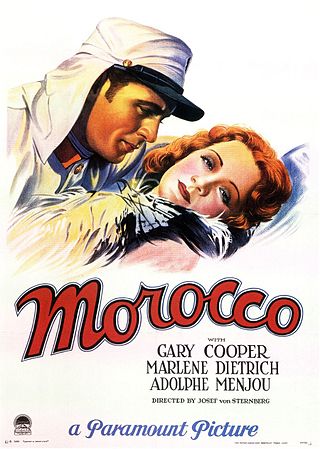
Morocco is a 1930 American pre-Code romantic drama film directed by Josef von Sternberg and starring Gary Cooper, Marlene Dietrich, and Adolphe Menjou. Based on the 1927 novel Amy Jolly by Benno Vigny and adapted by Jules Furthman, the film is about a cabaret singer and a Legionnaire who fall in love during the Rif War, and whose relationship is complicated by his womanizing and the appearance of a rich man who is also in love with her. The film is famous for a scene in which Dietrich performs a song dressed in a man's tailcoat and kisses another woman, both of which were considered scandalous for the period.

Crispin Hellion Glover is an American actor, filmmaker and artist. He is known for portraying eccentric character roles on screen. His breakout role was as George McFly in Back to the Future (1985), which he followed by playing Layne, one of the leading roles in River's Edge (1986). Through the 1990s, Glover garnered attention for portraying smaller but notable roles, including Cousin Del in Wild at Heart (1990), Andy Warhol in The Doors (1991), Bobby McBurney in What's Eating Gilbert Grape (1993) and the Train Fireman in Dead Man (1995).

Erik Weihenmayer is an American athlete, adventurer, author, activist and motivational speaker. He was the first blind person to reach the summit of Mount Everest, on May 25, 2001. Due to this accomplishment he was featured on the cover of Time magazine. He completed the Seven Summits in September 2002, one of only 150 mountaineers at the time to do so, but the only climber to achieve this while blind. In 2008, he also added the Carstensz Pyramid thus completing the Eight Summits. Weihenmayer has also made noteworthy climbs up the Nose of El Capitan in Yosemite in 1996, and ascended Losar, a 2,700-foot (820 m) vertical ice face in the Himalayas in 2008.

Through a Glass Darkly is a 1961 Swedish drama film written and directed by Ingmar Bergman, and starring Harriet Andersson, Gunnar Björnstrand, Max von Sydow and Lars Passgård. The film tells the story of a schizophrenic young woman (Andersson) vacationing on a remote island with her husband, novelist father (Björnstrand), and frustrated younger brother (Passgård).

Richard Nelson Corliss was an American film critic and magazine editor for Time. He focused on movies, with occasional articles on other subjects.
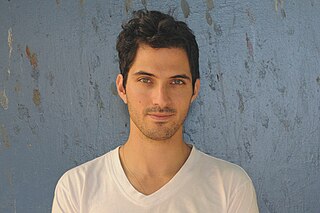
Joshua Simon, is a curator, writer, publisher, cultural critic, poet, filmmaker and public intellectual. He currently lives in Philadelphia, PA.
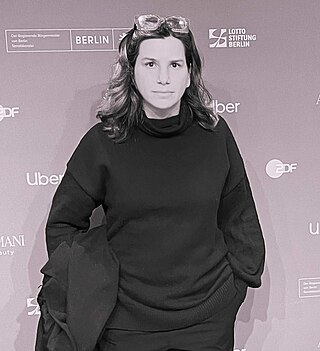
Keren Cytter is an Israeli visual artist and writer.

Expelled: No Intelligence Allowed is a 2008 American documentary-style propaganda film directed by Nathan Frankowski and starring Ben Stein. The film contends that there is a conspiracy in academia to oppress and exclude people who believe in intelligent design. It portrays the scientific theory of evolution as a contributor to communism, fascism, atheism, eugenics, and in particular Nazi atrocities in the Holocaust. Although intelligent design is a pseudoscientific religious idea, the film presents it as science-based, without giving a detailed definition of the concept or attempting to explain it on a scientific level. Other than briefly addressing issues of irreducible complexity, Expelled examines intelligent design purely as a political issue.
The Great Pyramid Monument is a German proposal for a mausoleum, patterned after the Great Pyramid of Giza in Egypt.
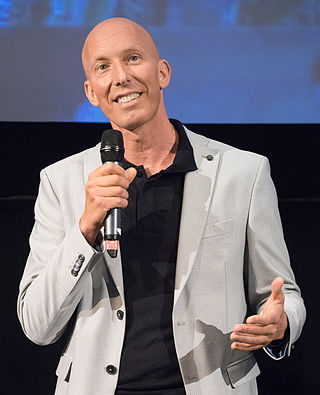
Erik Walter Gandini is an Italian-Swedish film director, writer, producer and professor of documentary film at Stockholm University of the Arts.
Ingo Niermann is a German novelist, writer, and artist.
Pietra Brettkelly is a New Zealand filmmaker, known for her documentaries. She is a documentary filmmaker submitted three times for Oscar consideration, a member of The Academy of Motion Pictures Arts and Sciences, and was recently named an Arts Laureate of New Zealand. Her films have premiered in five of the world's top six film festivals – Sundance, Toronto, Venice, Berlin and Tribeca Film Festivals – and have garnered many awards. She is known for her independent, risk-taking style, which has taken her to many different countries. She approaches her subjects' lives with a "quiet" demeanor and "non-judgmental" attitude, allowing her to capture and document real stories.

Erik Niedling is a German artist. He is also known for his 2010 film The Future of Art, a documentary on the contemporary art scene.

Space Tourists is a feature-length documentary of the Swiss director Christian Frei. The film had its premiere at the Zurich Film Festival in 2009 and has won the "World Cinema Directing Award" at the Sundance Film Festival in 2010.
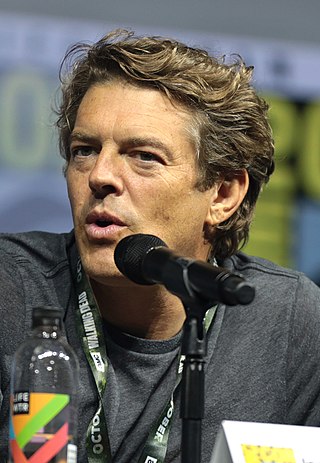
Jason Ferus Blum is an American producer. He is founder and CEO of Blumhouse Productions, which has produced the horror franchises Paranormal Activity (2007–2021), Insidious (2010–2023), The Purge (2013–2021), and Halloween (2018-2022). Blum has also produced Sinister (2012), Oculus (2013), Whiplash (2014), The Gallows (2015), The Gift (2015), Hush (2016), Split (2016), Ouija: Origin of Evil (2016), Get Out (2017), Happy Death Day (2017), Upgrade (2018), Us (2019), The Invisible Man (2020), Freaky (2020), The Black Phone (2021), M3GAN (2022) and Five Nights at Freddy's (2023), Night Swim (2024), Imaginary (film) (2024), Afraid (film) (2024) and Speak No Evil (film) (2024).
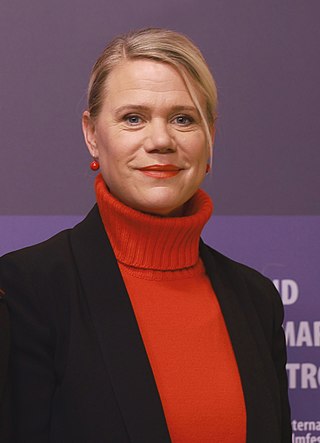
Frauke Finsterwalder is a German film director and screenwriter. Finsterwalder has directed several shorts and documentaries. Her feature film directorial debut, Finsterworld, was released in 2013. For her second feature film, Sisi & I, released in 2023, she was awarded the Bavarian Film Award for Best Director.

Drew Struzan is an American artist, illustrator and cover designer. He is known for his more than 150 movie posters, which include The Shawshank Redemption, Blade Runner, E.T. the Extra-Terrestrial, as well as films in the Indiana Jones, Back to the Future, and Star Wars film series. He has also painted album covers, collectibles, and book covers.

Alexa Karolinski is a German writer, director and producer whose work includes music videos, commercials, film and television. She is the creator of the television drama Unorthodox (2020).
Casco Art Institute: Working for the Commons is a non-profit public art institution based in Utrecht, Netherlands.
Erik Nelson is an American documentary film director and television producer. Nelson has produced and directed several films, television specials and television programs such as Ripley's Believe It or Not!, Mega Disasters, When Good Times Go Bad, What Were You Thinking?, Unsolved History, Prehistoric Predators and More than Human.




























